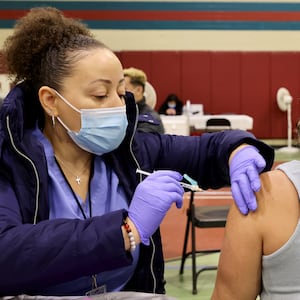The world is continuing to learn how to live with COVID-19, but we’re still caught under the alarming specter of new variants. A single new strain with more ferocious infectivity and danger could send the world back into a public health emergency, including renewed lockdowns and a resurgence in remote work and education. To that end, there’s been no shortage of work among researchers to design a COVID vaccine that could safeguard people from the whole spectrum of variants—current and future alike.
Several institutions are already racing to develop a universal COVID jab, and now researchers at MIT think they may have found one that could get us across the finish line. If it does end up passing all the tests and making its way into our arms, you’ll have AI to thank.
A new study published in Frontiers in Immunology on Mar. 9 and led by scientists at MIT reports successful experiments to inoculate mice with a new vaccine designed to protect against all COVID variants—even ones that have not emerged yet. The vaccine was developed thanks to discoveries made using AI algorithms, and the new experiments demonstrate the vaccine’s ability to prevent death from COVID infection.
“This study offers proof in a living system, an actual mouse, that the vaccines we devised using machine learning can afford protection from the COVID virus,” Brandon Carter, a PhD student at MIT’s Computer Science and Artificial Intelligence Laboratory and a lead author of the new paper, said in a statement. The team characterizes its work as the first experimental evidence that a vaccine made through this AI approach is effective in preventing disease.
The most popular COVID vaccines today, such as ones developed by Moderna and Pfizer, work by priming the immune system to identify the COVID virus's spike protein (a key component of how the virus initiates infection), and produce neutralizing antibodies. Unfortunately, as we’ve learned over the last few years, the spike protein is also a structure more prone to mutation than other parts of the virus. These mutations are what have made variants like Delta and Omicron especially prevalent.
So the researchers instead want to make a vaccine that works differently. Rather than enable a vaccine to detect the COVID virus early and fire off antibodies to prevent a full-blown infection, the team wants to activate the part of the immune system that produces and fires off “killer” T cells that attack infected cells. This won’t prevent infection, but it could be a very easy solution to stopping severe illness or even death.
The team decided to bring in AI techniques into the design process, using machine learning algorithms to identify what parts of the COVID virus should be used as part of the vaccine. The algorithms helped whittle down the list of viral proteins from thousands to just about 30 or so. These proteins are ones that pop up on the surface of infected cells and which the immune system can spot to determine what needs to be eliminated. The algorithms helped determine which of these proteins are least likely to be subject to mutation as more variants arise.
After developing the vaccine, the team jabbed laboratory mice and then infected them with the Beta variant of COVID. The mice fell ill, but they didn’t die. And they exhibited a robust immune response thanks to vaccination—some lung samples studied afterward were 24 percent T cells.
That may sound like a low bar to meet—and to some extent, that’s true. Most notably, the results only prove the vaccine works against the Beta variant, and not yet as a “universal” vaccine. But this baseline result does mean the vaccine meets the threshold for further testing in animals and eventually humans. It also opens up the door to further investigation into T-cell vaccines as a whole—especially for immunocompromised individuals who are no longer able to produce neutralizing antibodies—and validates the use of new AI tools to help design new disease treatments.








